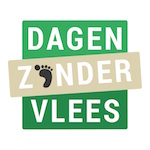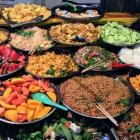Days without meat: the non-vegetarian initiative that convinced 86,000 people to skip meat
Submitted by Liesa Carton on | Updated Sat, 17/09/2016 - 23:49
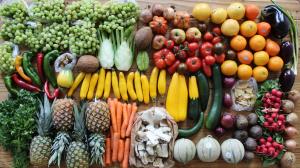
As a Flemish girl, I was taught that a decent meal had to have potatoes, vegetables and meat. But in 2011, another Flemish girl turned my ideas about food upside down: Alexia Leysen decided she would skip meat for 40 days to reduce her ecological footprint. This year, 86,000 others are joining her in her Dagen Zonder Vlees (days without meat) – which is pretty impressive for a population of 6.4 million Flemish people. Communications manager Marieke Dilles explains why it is so popular. Hint: it's easy and delicious. And you can still participate!
What is the secret to the success of Dagen Zonder Vlees?
Marieke: It is so accessible and easy. Everyone knows about global warming, many people want to do something about it, but most of the time we feel powerless: ‘What difference can one person make? It’s the government that has to change things.’ … That’s how most people think.
Dagen Zonder Vlees proves them wrong. Things do not only change top-down, we can change them bottom-up as well. One 21-year-old girl showed us how easy it is to make a difference and the way she did this is remarkable: she never wagged her finger. I think it helps that this is an initiative by non-vegetarians – meat-eaters seem to be more willing to listen to us. We are not asking people to become vegetarians. All we ask is to skip meat just once a week.
Our calendar is also very easy to use: for every day you did not eat meat or fish, you can tick one box. The website calculates how much of your ecological footprint you have saved that day, and since the start.
On top of that, there are tons of delicious recipes on our website, which is important, because you need to know how to replace meat.
dagen_zonder_vlees_recept_klein.jpg
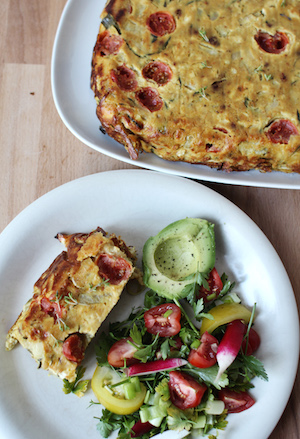
What makes this edition different from previous ones?
We are focussing on more than just meat. We want to make sure there’s a challenge for everyone, including the people who have been participating from the beginning and vegetarians. So this year you can still fill in the calendar for every day you didn’t eat meat, but you can also indicate whether you had seasonal vegetables, whether you cooked with leftovers and whether you bought no plastic that day. You can pick your challenge or try all of them if you’re a real die-hard.
What makes this year extra special, is that we have asked politicians to participate. So now twenty of them have subscribed, including the party presidents of the five main parties in Belgium. We have also published a book with recipes by 24 cooks. All of the dishes are vegetarian and are made with seasonal vegetables. And the book includes practical advice on reducing waste and cooking with leftovers.
Why is skipping meat good for the environment?
Meat production is one of the main causes of climate change, because it emits more greenhouse gases than all planes and cars combined. Apart from that, it uses huge amounts of water and land. A cow drinks about 100 liters of water per day and you need water to produce the feed, so for 1 kilogram of beef, you need about 15,500 liters of water. According to a UN study, about 70 percent of the water used in agriculture worldwide, is used for the production of meat.
Around 30 percent of the Earth’s surface is used for meat production. Every year this causes 7.4 million acres of forest to disappear, to make room for meadows or land for animal feed. For 1 kilogram of beef, you need 8 kilograms of soy or wheat – it would be a lot more efficient to just feed people with the soy or wheat.
By introducing one vegetarian day a week, you already save 11 m2 on your ecological footprint. In terms of your carbon footprint, that means 3.4 kg CO2 each day, or 136 kg CO2 over 40 days. If you eat vegan, it's 4.3 kg CO2 each day, and 172 kg CO2 over the 40 days. Partly thanks to Dagen Zonder Vlees, people seem to realize it more and more, I’ve really noticed a change in mindset the past years.
“Meat production emits more greenhouse gases than all planes and cars combined.”
How have things changed in the past 5 years?
Vegetarianism is a lot more ‘mainstream’ now, which makes it easier. I was a vegetarian for a while in my teenage years, but I had to start eating meat again for my health because I wasn’t replacing it well, as vegetarianism was not that common. Now things are different. I live in Antwerp, in the neighbourhood that is famous for its meat production. I am surrounded by butchers and meat restaurants and even there I can find vegetarian meals during Dagen Zonder Vlees. So even those people don’t think it’s weird anymore.
dagen_zonder_vlees_alexia_leysen_marieke_dilles_klein.jpeg
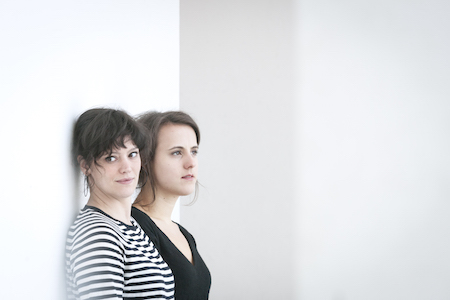
So have you been able to convert real meat-eaters so far?
I think you are a great example yourself. And a lot of people have told us that when the period was over, they just continued skipping meat once a week, to keep on cooking the recipes they had discovered. Other people have become full-time vegetarians. So yes, we do have a huge impact.
When is Dagen Zonder Vlees going global?
Not any time soon, but that would be very nice indeed! For now, we’re focussing on Flanders. We do have information in English for foreign students or expats who want to participate (see below), so everyone who speaks English can fill in the calendar! It explains what the initiative is about and how they can sign up, using Facebook or their email address. Once they’re logged on, it is really easy.
If we are going to target other countries, we have to translate everything – including all of our recipes. But it’s not just a matter of language, not all countries know the concept of Lent(1) or know it the same way we do.
And even in Flanders the tradition has faded. If you would ask young people in the street nowadays, I’m pretty sure they would have no idea what you’re talking about. So in a couple of generations the idea of Lent will be entirely gone. Or everyone will be participating in Dagen Zonder Vlees, of course.
About Dagen Zonder Vlees
Dagen Zonder Vlees, literally translated as Days Without Meat, is a trendy Flemish campaign about the ecological impact of our eating habits on the environment. The idea is simple: to eat less meat and fish during the 40 days of Lent (10 Feb – 26 Mar 2016). Every year, a growing number of people take up the challenge. Together they try to reduce their collective ecological footprint as much as possible.
This year, our focus is on participation as a group. This makes it much more fun and it increases our collective impact.
You can already participate as of 1 veggie day per week.
Subscribe and participate
Unfortunately, we don’t have an English version of our website yet but supported by the following tips it should be no problem to join; the user-friendly calendar speaks for itself, once you’ve managed to subscribe.
Go to www.dagenzondervlees.be and click at the top right of the page on 'Schrijf u in'! Registration via Facebook is the easiest way if you don’t know any Dutch.
Once subscribed, your personal calendar is displayed. As from the campaign start on February 10, you can mark your veggie day (no meat and no fish) green just by clicking on it.
Do you want to participate in a group? Find your favourite company, university, organization etc. on www.dagenzondervlees.be/groepen/ and click on ‘Word lid’ (‘Become a member’). If you want to invite others to join, just press ‘Uitnodigen’, add the email address(es) and submit your request.
Take up the challenge, each day counts!
(1) Dagen Zonder Vlees takes place during the Christian period of Lent, “a solemn religious observance in the liturgical calendar of many Christian denominations that begins on Ash Wednesday and covers a period of approximately six weeks before Easter Sunday. (…) During Lent, many Christians commit to fasting or giving up certain types of luxuries as a form of penitence.” (Wikipedia, https://en.wikipedia.org/wiki/Lent, consulted February 1st)
More information:
- info@dagenzondervlees.be
- www.dagenzondervlees.be
- https://www.hongkongfp.com/2015/11/27/a-steaks-contribution-to-global-warming/
- FAO report
You will save the Earth by sharing and/or tweeting (corny right?)

